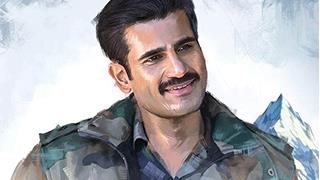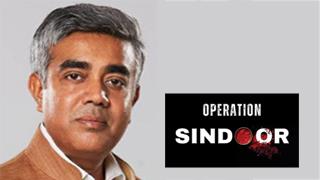The two actors, who starred together in the 2016 romantic film Sanam Teri Kasam, are now at odds in a digital showdown that highlights the fragility of Indo-Pak cultural ties.
Mawra Hocane Slams Rane Over “Insensitive PR Stunt”
The controversy erupted when Mawra Hocane criticized Rane in a scathing public remark. Without naming the exact trigger, she took issue with what she perceived as a calculated publicity move during a time of national conflict.
"Someone I expected to have basic common sense has risen from deep slumber with a PR strategy," Hocane stated. "While our nations are at war, this is what you come up with? A PR statement to get attention? What a pity."
Her statement came amidst rising nationalistic sentiments and widespread support in India for Operation Sindoor, the country’s military response to the recent Pahalgam terror attack.
Harshvardhan Rane Responds: “No Tolerance for Insults to My Nation”
Rane took to Instagram Stories to respond, delivering a composed yet firm rebuttal. While avoiding any direct personal insult, he emphasized that he could tolerate personal barbs — but not any disrespect toward India.
“That sounded like an attempt at a personal attack. Fortunately, I have the tolerance to overlook such attempts — but have zero tolerance for any attack on my nation's dignity,” he wrote.
In a sharp metaphor that drew from India's rural roots, he added:
“An Indian farmer would pluck out the unwanted weed from his crop — it’s called weeding. The farmer doesn’t need a PR team for this act; it’s called common sense.”
The metaphor was seen by many as a thinly veiled reference to cutting ties with toxic influences, reinforcing his national loyalty and refusal to collaborate with voices critical of India’s defense actions.
Stepping Away from Sequel: A Matter of Conviction
Rane also clarified his professional decision to distance himself from a potential sequel to Sanam Teri Kasam. Stressing that it was not a PR tactic but a matter of personal ethics, he stated:
“I simply offered to step down from Part 2. I’m fully within my rights to choose not to work with individuals who label my country’s actions as ‘cowardly.’”
He made it clear that his silence had been misinterpreted and that his decision was rooted in principle, not publicity.
No Personal Attacks: Rane Maintains His Dignified Stand
Throughout his response, Rane maintained that he had never made personal attacks or even named Hocane before her remarks. Instead, he pointed to the tone of her statement, which he said was filled with hate and personal jabs.
“So much hate in her speech, so many personal remarks. I never mentioned her name or attacked her dignity as a woman. I intend to maintain that standard,” he wrote.
His emphasis on mutual respect and professionalism, even during a public spat, gained him support among many Indian netizens who applauded his mature tone.
When Art and Politics Collide: A Cultural Fallout
This public rift between former co-stars underscores the deepening cultural divide between India and Pakistan, especially in the aftermath of cross-border tensions. What once was a platform for cinematic unity and shared storytelling has now become a battleground of national sentiment and ideological differences.
The online clash also raises broader questions:
Can creative collaborations survive national conflict?
Where is the line between personal opinion and national responsibility for public figures?
In the context of Operation Sindoor, which has stirred strong emotions across both nations, the Harshvardhan Rane–Mawra Hocane feud serves as a microcosm of the broader Indo-Pakistan narrative, marked by patriotism, polarization, and fractured partnerships.
Conclusion: Nationalism vs. Art — A Divisive Crossroad
The heated exchange between Harshvardhan Rane and Mawra Hocane is more than a celebrity feud — it's a telling reflection of how artistic bridges can collapse under political pressure. With both actors standing firm on their convictions, the situation has spotlighted the growing divide between cultural diplomacy and nationalistic loyalty.
In times of heightened conflict, the entertainment industry, once seen as a neutral and unifying force, now finds itself entangled in narratives of identity, allegiance, and ideology. Whether this is a temporary fallout or a permanent shift in how cross-border collaborations are perceived remains to be seen.




















